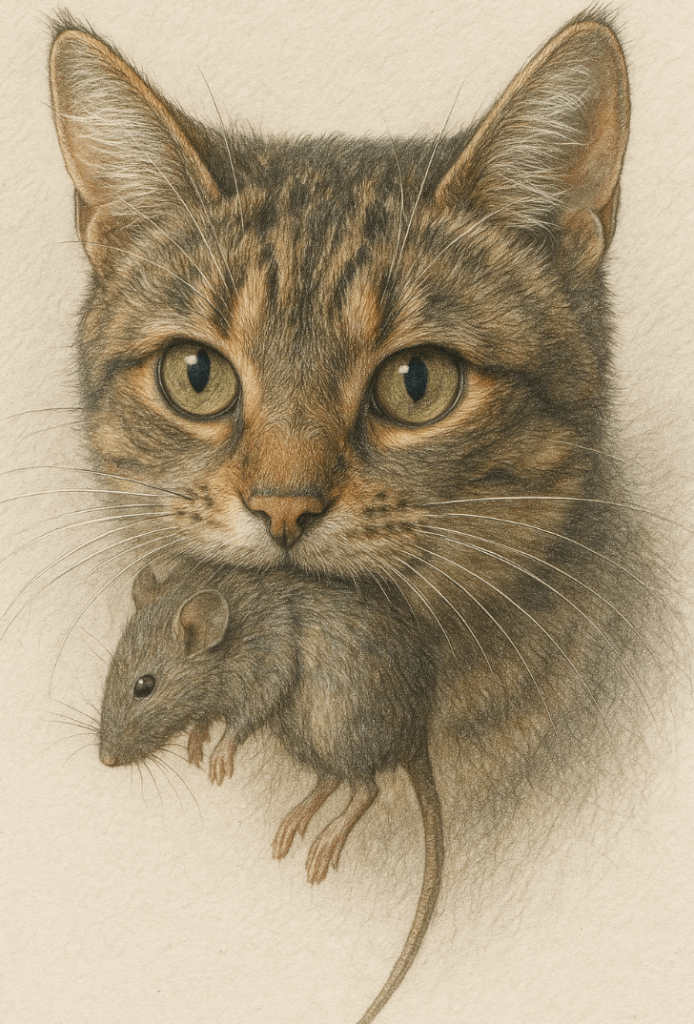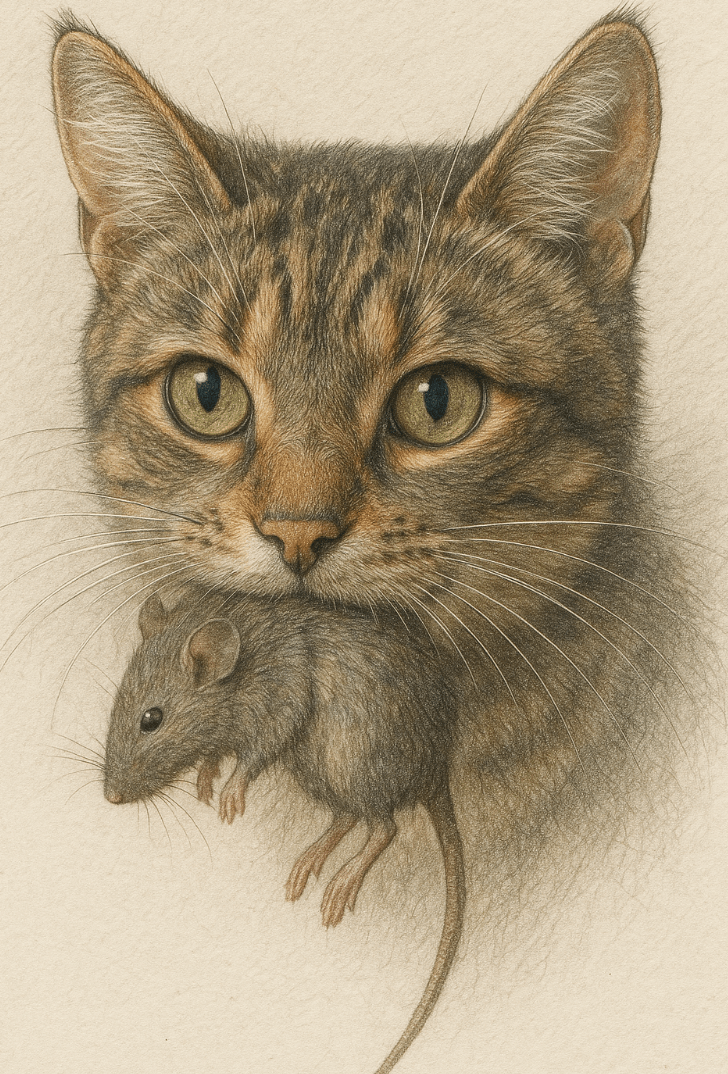Can Cats Eat Mice?
Cats are natural-born hunters, and their instinct to chase and catch small prey like mice is deeply ingrained in their behavior. For many cat owners, watching their feline friend proudly present a “gift” of a mouse can be both fascinating and unsettling. But is it safe for cats to eat mice? While hunting and consuming prey aligns with their carnivorous nature, there are important considerations to keep in mind.
In this blog post, we’ll explore the pros and cons of cats eating mice, potential health risks, and how to manage your cat’s hunting instincts responsibly. Whether you’re a new cat owner or simply curious about feline behavior, this guide will help you understand what happens when your cat catches—and eats—a mouse.
Potential Risks of Cats Eating Mice
While eating mice may seem natural for cats, it comes with several risks that every pet owner should be aware of. These hazards range from parasitic infections to accidental poisoning, making supervision and prevention crucial.
Parasites Like Roundworms:
Mice can carry intestinal parasites such as roundworms, which can infect your cat if ingested.Toxoplasmosis Risk:
Mice may harbor the Toxoplasma gondii parasite, which poses a health risk to both cats and humans.Secondary Poisoning:
If the mouse has consumed rodenticide or other toxins, your cat could suffer secondary poisoning after eating it.Bacterial Infections:
Raw meat from mice can contain harmful bacteria like Salmonella or E. coli, which may cause illness.Choking Hazards:
Small bones or pieces of the mouse can get lodged in your cat’s throat, leading to choking or injury.
These risks highlight why it’s essential to monitor your cat’s hunting activities and take steps to minimize exposure to potential dangers.
Benefits of Cats Eating Mice (When Safe)
Despite the risks, there are some benefits to cats eating mice, especially for outdoor or semi-feral cats. When done safely, it can align with their natural instincts and dietary needs.
Nutritional Value:
Mice provide protein, fats, and essential nutrients that mimic a cat’s ancestral diet in the wild.Mental Stimulation:
Hunting and eating prey engages a cat’s natural instincts, providing mental enrichment and reducing boredom.Dental Health:
Gnawing on bones and chewing through tough tissues can help clean teeth and reduce plaque buildup.Weight Management:
Active hunting burns calories, helping maintain a healthy weight for outdoor or highly active cats.Instinctual Satisfaction:
Allowing controlled hunting satisfies a cat’s innate predatory drive, promoting behavioral balance.
While these benefits exist, they must be weighed against the potential dangers to ensure your cat’s safety.
Check this guide 👉Can Cats Eat Mozzarella Cheese? Best 7 Expert Tips!
Check this guide 👉Can Cats Eat Chives? Best 7 Expert Tips!
Check this guide 👉Can Cats Eat Coconut Oil? Best 7 Expert Tips!

Safe Practices Around Cats Eating Mice | Risks Associated with Mice Consumption |
|---|---|
Supervise outdoor hunting activities | Parasites like roundworms or tapeworms |
Keep cats indoors to avoid exposure | Secondary poisoning from rodenticides |
Provide regular deworming treatments | Bacterial infections like Salmonella |
Offer balanced commercial diets | Choking on bones or fur |
Consult your veterinarian regularly | Toxoplasmosis transmission |
How to Manage Your Cat’s Hunting Instincts
If your cat enjoys hunting mice, it’s important to manage their behavior responsibly to protect their health and safety. Here are some practical tips to guide you.
Keep Your Cat Indoors:
Indoor cats are less likely to encounter mice and the associated risks of hunting them.Provide Safe Alternatives:
Interactive toys and puzzle feeders simulate hunting without the dangers of real prey.Regular Veterinary Check-Ups:
Schedule routine vet visits to test for parasites or infections caused by eating mice.Use Preventive Treatments:
Administer flea, tick, and worm prevention medications as recommended by your vet.Secure Your Home:
Seal cracks and gaps to prevent mice from entering your home, reducing temptation for your cat.
By taking these precautions, you can strike a balance between honoring your cat’s instincts and ensuring their well-being.
Signs Your Cat May Be Sick After Eating a Mouse
Even with precautions, complications can arise if your cat consumes a mouse. Watch for these warning signs to act quickly if something goes wrong.
Vomiting or Diarrhea:
These symptoms may indicate an infection or ingestion of harmful substances.Lethargy or Weakness:
A sudden lack of energy could signal poisoning or a parasitic infection.Loss of Appetite:
Refusing food is a common sign that your cat isn’t feeling well after eating something unusual.Excessive Drooling:
Drooling could indicate nausea or irritation caused by ingesting toxins or sharp objects.Visible Worms in Feces:
Finding worms in your cat’s stool suggests a parasitic infection requiring immediate treatment.
Recognizing these signs early allows you to seek veterinary care promptly, preventing further complications.
Common Misconceptions About Cats Eating Mice
Despite being a natural behavior, several misconceptions surround cats eating mice. Clarifying these myths helps set realistic expectations for pet owners.
All Cats Hunt Mice:
While most cats have the instinct, not all actively hunt or eat mice, especially indoor cats.Eating Mice Is Always Harmful:
In controlled environments, eating mice isn’t inherently dangerous but requires monitoring for risks.Indoor Cats Can’t Get Sick from Mice:
Even indoor cats can encounter mice carrying diseases or toxins, so vigilance is key.Hunting Mice Is Just a Game:
For cats, hunting is more than play—it fulfills a biological need for stimulation and satisfaction.Cats Don’t Need Supplements if They Eat Mice:
Mice alone don’t provide a complete diet; commercial food ensures balanced nutrition.
Dispelling these myths ensures a deeper understanding of your cat’s behavior and needs.
Health Considerations for Outdoor Hunting Cats
For outdoor cats who frequently hunt mice, additional health considerations are necessary to mitigate risks. Being proactive about their care helps ensure a long and healthy life.
Regular Deworming:
Outdoor cats should receive deworming treatments every few months to prevent parasitic infections.Vaccinations:
Keep vaccinations up-to-date to protect against diseases that mice may carry.Flea and Tick Prevention:
Use preventive treatments to guard against pests that mice might introduce.Monitor Behavior Changes:
Sudden changes in appetite, energy levels, or grooming habits may indicate underlying issues.Limit Exposure to Rodenticides:
Avoid using poison-based pest control methods in areas where your cat roams.
Proactive healthcare ensures your outdoor cat stays healthy despite their hunting habits.
Alternatives to Satisfy Your Cat’s Hunting Instincts
If you want to discourage your cat from hunting mice—or simply provide safer outlets for their instincts—these alternatives can help redirect their energy.
Interactive Toys:
Feather wands, laser pointers, and plush mice toys simulate hunting without the risks.Puzzle Feeders:
Food-dispensing puzzles challenge your cat mentally and physically, mimicking the thrill of the hunt.Catnip-Filled Toys:
Toys infused with catnip stimulate play and distract from real prey.Window Perches for Bird Watching:
Providing a view of birds or squirrels outside satisfies their curiosity and hunting drive.Training Sessions:
Teach tricks or commands using treats to engage their focus and reward good behavior.
These alternatives allow you to cater to your cat’s instincts while keeping them safe and entertained.
Frequently Asked Questions About Cats Eating Mice
Is it normal for cats to eat mice?
Yes, it’s natural for cats to hunt and eat mice, but it comes with certain risks that need to be managed.
Can indoor cats catch mice?
While less common, indoor cats can still encounter mice if they enter your home.
What should I do if my cat eats a poisoned mouse?
Contact your veterinarian immediately, as secondary poisoning can be life-threatening.
Do cats get sick from eating mice often?
Not always, but the risk of parasites, infections, or toxins makes it a possibility.
How can I stop my cat from hunting mice?
Keeping your cat indoors and providing engaging toys can redirect their hunting instincts.
Balancing Nature and Safety for Your Cat
Cats eating mice is a reflection of their natural instincts as skilled predators, but it’s up to us as responsible pet owners to ensure their safety. By understanding the risks, providing alternatives, and staying vigilant about their health, you can honor your cat’s innate behaviors while protecting them from harm. Remember, a happy and healthy cat is one whose needs—both physical and instinctual—are met with care and attention. Whether your cat is an indoor companion or an avid hunter, striking this balance will strengthen your bond and ensure their well-being for years to come.
Do Cats Have Taste Buds? Best 7 Expert Tips! – Discover how cats experience flavors and why their taste is so unique.
Do Dogs Have Taste Buds? Best 7 Expert Tips! – Discover how dogs experience taste, their preferences, and what it means for their diet and health.
Can Cats Taste Sweet? Best 7 Expert Tips! – Discover why cats can’t taste sweetness, how it affects their diet, and tips to keep them healthy and happy.
Can Dogs Taste Sweet? Best 7 Expert Tips! – Discover how dogs perceive sweetness, which foods are safe, and tips to manage their sweet cravings responsibly.





